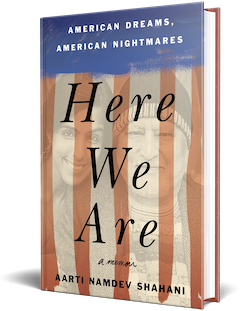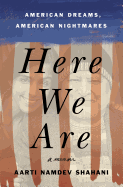Here We Are: American Dreams, American Nightmares
by Aarti Namdev Shahani
On the surface, Aarti Shahani's parents had a classic immigrant narrative: hungry for more job opportunities and education for their children, for a better life, they came to the U.S. in the 1980s. Aarti's insightful first book, Here We Are: American Dreams, American Nightmares, paints a layered and engaging picture of her family and their joys and struggles. The Shahanis lived in a vibrant, diverse community in Queens, where Aarti's mother became a community activist. Her father and uncle ran a small electronics shop in midtown Manhattan. But the reality--from start to finish--is much more complicated. The Shahanis came to the U.S. from their native India (via Morocco) to escape a dysfunctional family dynamic. Their apartment building in Flushing was crowded and cockroach-infested. And when Aarti's father and uncle were accused of selling electronics to a notorious Colombian drug cartel, their whole family spent years tangled in the U.S. legal system. Both men served time at the notorious Rikers Island prison; Aarti's uncle Ratan was eventually deported, never to be allowed to return. But Aarti--now a tech correspondent covering Silicon Valley for NPR--was determined to fight for her father's freedom. In Here We Are, she tells her family's story and asks compelling questions about what it means to belong in this country.
Shahani begins her account with a flash forward: a latter-day meeting with the judge who was in charge of her father's case. As a bright, impassioned high school student who attended the elite Brearley all-girls school on Manhattan's Upper East side, Aarti was ashamed. But over time, as she saw the system take advantage of her family's lack of power, she got involved. She wrote multiple letters to the judge, prompting him to call her his "pen pal."
She recounts her meeting with him as a 30-something woman, before taking readers back in time several decades to share the story of how her parents met (in Casablanca), their growing young family (including her big brother, Deepak, and her sister, Angelly), and their eventual migration to New York City. Her family emerges in vivid, textured detail: her mother, the extroverted community activist who started a tenants' association in their building; her quiet dad, who spent his days working hard to provide for his family and preserve his "good name"; and her siblings, with whom she squabbled at times and banded together with when necessary. After their father and uncle were detained, Aarti began researching every legal loophole she could think of, calling lawyers and trying to find a way out for both of them.
Shahani pulls no punches in detailing the government's treatment of immigrants accused or convicted of even minor crimes, particularly those with a green card as well as those with non-permanent immigration status. She details the hopelessness of legal battles, the violence endemic to Rikers and other prisons, and the mixture of emotions when her father was finally released.
As a young adult, Shahani went on to start a nonprofit, Families for Freedom, that sought to help other immigrants mired in the legal system find their way to freedom. She notes the racism often present in the justice system, and how lawyers and other professionals often prey on frightened immigrants who may struggle with English or the legal technicalities. She also talks honestly about the deep fatigue that sets in after years of this work, the difficulty in not becoming jaded, and admits to the impatience she felt with her father at times. "Being a daughter was always central to my character," she says, and that relationship, in all its messy, glorious complexity, is on full display.
Namdev Shahani's case struggled through the legal system soon after the events of September 11, 2001--long before the current political administration and the present-day immigration debates. But the system, and many of its challenges, remain exactly the same, and the questions Aarti Shahani asks in her book are still entirely relevant: Who belongs in America? Who gets to become an American, and who gets to decide? Does intent matter when a crime is committed, and how can a "justice" system incarcerate and abuse those who cannot speak for themselves? The Shahanis' story, like that of so many immigrants, is a mixture of tragedy and hope, and Aarti highlights both, along with her deep love for her father.
Here We Are is a searing exposé of the U.S. criminal justice system and its glaring flaws, and a love letter from an impetuous, outspoken daughter to her soft-spoken, hardworking father. It goes beyond the scripted immigrant narrative to highlight the Shahanis in their complicated humanity, and it makes an insistent case for readers to do the same. It is at once a statement from Aarti to her dad--we will keep fighting for you until the end--and a declaration by millions of immigrants: we are part of this country, and we are not going anywhere. Clear-eyed and compulsively readable, shot through with compassion, humor and heart, Here We Are is a quintessential immigrant story and an urgent call for change. --Katie Noah Gibson








